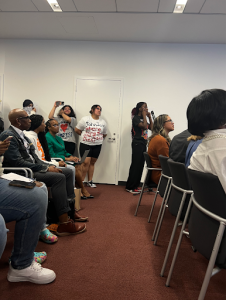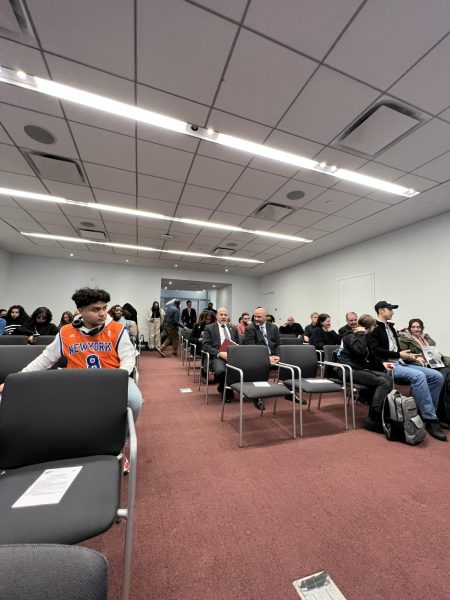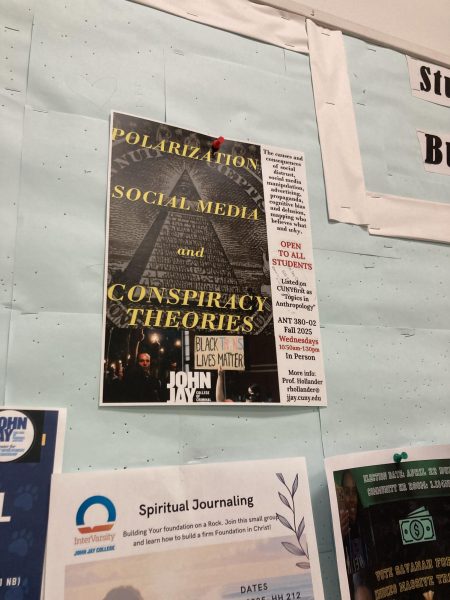Why Do Some Students Refuse to Speak Their Foreign Language on Campus?

April 1, 2019
Spanish, French, and Portuguese are among the many languages spoken at John Jay, however, there are some students who are refusing to speak them because of political stigma and lack of fluency.
According to the John Jay website, fifty percent of students are raised in a home where a language other than English is spoken.
Speaking a foreign language is something that should be practiced and applauded, but students state there is an obstacle in their way.
Jaylene Brea, a bilingual student who was born in the United States, but has Dominican roots, considers herself a heritage speaker. However, speaking Spanish is difficult for her because of her Dominican accent.
Other native speakers make fun of the way she speaks and according to her, no one understands what she says.
“I’ve already been told that my accent is improper by some native speakers,” Brea said.
Although Brea considers herself fluent, she does admit at sometimes having problems getting her ideas across.
“Usually when I struggle, rather than letting me finish my statement in Spanish, they always end up telling me to just speak English,” Brea said. “I want to better my Spanish, but they won’t let me improve. So I just gave up.”
Andy Pinho, a sophomore student who is majoring in Psychology admits he can speak Portuguese but refuses to do so on campus. Born from parents who are from Ecuador and Brazil, he considers himself a heritage speaker and is conflicted with how others might perceive the way he speaks.
“I just pretend I don’t know Portuguese and speak English,” Pinho said. “People barely even speak it so what’s the point? That language is not that important.”
For heritage speakers, their biggest obstacle is native speakers of the foreign language.
Those who want to improve are not given the chance to improve and are made fun of their accent. Others, rather than to struggle and look bad in front of others, shy away from speaking their foreign tongue.
However, for Xochitl Hernandez, a Criminal Justice major, there is a stigma against speaking her foreign language. Hernandez is from Mexico and speaks English, Spanish, and Nahuatl. She is a native speaker of both Spanish and Nahuatl and later learned English at the age of 5. Nonetheless, she would much rather stick to speaking English.
“Those languages remind me a lot of my childhood but my parents actually have told me to just speak English and to never speak Nahuatl for fears that I would get discriminated against,” Hernandez said.
Hernandez’s parents tried their best for her to be able to assimilate into American culture. So much so, that Hernandez now considers Nahuatl as part of her past. “English is far more important in the business world,” she said.
The North American Congress on Latin American (NACLA) states The Mexican Consulate has reported 250,000 indigenous people living in New York, and only a third of them speak one of Mexico’s 68 recognized indigenous languages.
Hernandez is a student who admits she is afraid of being stereotyped by today’s political climate. Even though she knows she is safe on campus at all times, she would much rather just communicate in English and says she is happy doing so.
“I do not want to give people the excuse to think I’m illegal or something and before they make an assumption of me, I begin to speak English so they’ll know I’m like one of them,” she said.
Jamaican Patois is also a language spoken by John Jay students.
Anique Anderson, a sophomore who speaks both Jamaican Patois and English, sticks to speaking English.
“I do not want to speak a broken language because of the stereotypical racist comments I face here,” Anderson said. “It just sounds bad, real bad.”
Born in Jamaica, Anderson is a native speaker of Patois, but learned English when she was 10.
“I do not want to be associated with a certain image,” Anderson said. “I just want to speak English. It’s the base language everywhere you go. You cannot tell me I’m wrong, am I?”










